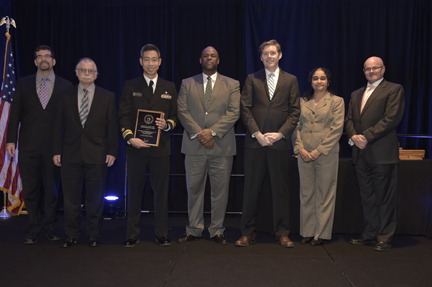
ORF/DTR FEMP Award at the Renaissance Hotel in Washington DC on December 7, 2016 .
The Department of Energy (DOE) Federal Energy Management Program (FEMP) Federal Energy and Water Management Awards recognize outstanding achievements in:
• Energy and water efficiency and conservation
• Renewable energy implementation
• Sustainable practices for high-performance buildings
• Fleet and transportation management.
On July 29, 2016, FEMP announced the winners for its 2016 Federal Energy and Water Management Awards, and the National Institutes of Health (NIH) Bethesda Campus Central Utility Plant (CUP) located in Bethesda, MD has been awarded the Program Award.
The NIH Office of the Director (OD) Office Research Facilities (ORF) Division of Technical Resources (DTR) has instituted a program within the CUP that focuses on work order management, documentation and record management, environmental stewardship, water and energy management, data management, training, and recognition. In FY2014, DTR utilized a combination of federal government employees and contractors to identify issues that compromised the CUP’s ability to produce chilled water and steam reliably to support the NIH research mission on the NIH Bethesda Campus in Bethesda, MD. In FY2015, DTR implemented a series of projects to address water chemistry issues, outdated standard operating procedures, lack of a computerized maintenance management information system (CMMIS), outstanding preventative maintenance and repairs performed for CUP assets, lack of a data archive, and a lack of meters and sensors to monitor critical operations. Overall these actions have reduced the NIH’s energy and water consumption costs by $14.1 million compared to the previous fiscal year. With an established CMMIS, data archive for gathering CUP sensor and meter data in real-time, and updated SOPs, DTR can position itself to sustain its gains in reducing the NIH’s water and energy consumption for future years to come.
Prior to DTR assuming full responsibility for CUP operations and maintenance, there were discussions within ORF to expand the Chiller Plant by 25% to meet NIH Bethesda Campus cooling demand. In FY2015, DTR demonstrated the current Chiller Plant met cooling demand with using fewer than nine chillers in what is declared as one of the hottest summers on record according to the National Oceanic Atmospheric Administration (NOAA)[i]. DTR has shifted ORF’s outlook to decrease the total capacity of the Chiller Plant by 15% in their future planning. DTR is exploring ways to maximize efficiency by incorporating steam driven chillers, leveraging free cooling, and installing variable frequency drives for the chiller motors and cooling tower fans. The program DTR erected within the CUP has shifted NIH’s outlook towards facility operations and management—State of the Art Facilities supporting State of the Art Research to “enhance health, lengthen life, and reduce illness and disability.”